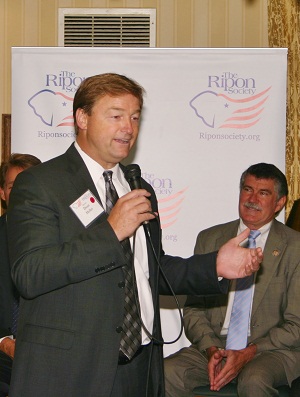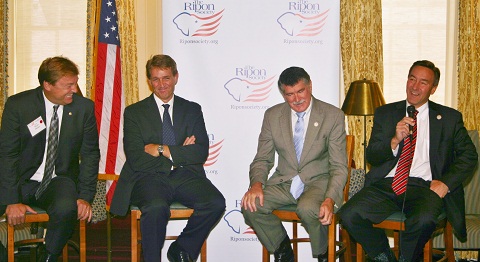Heller, Flake, Rehberg and Berg Discuss Health Care, Immigration and Economic Growth in Appearance Before Ripon Society

WASHINGTON, DC – The Ripon Society held a breakfast meeting this past Tuesday with four lawmakers from the American West, who discussed the importance of job creation in their respective states and how three issues currently being debated in Washington are affecting the people they represent back home.
The lawmakers were Nevada Senator Dean Heller and Representatives Jeff Flake (AZ-6), Denny Rehberg (MT-AL), and Rick Berg (ND-AL), who, in his opening remarks to the 50-year old centrist Republican public policy organization, discussed how his state has been transformed over the past decade, and the geological and political factors that have made this transformation possible.
“North Dakota is changing,” the first-term Representative stated. “The reason it’s changing is the Bakken Formation. Ten years ago, we were in a deficit like every other state. And what we did is said, ‘You know what, we’re going to encourage the private sector. We’re going to take the government and make it stable.’ Stable regulation, stable taxation, and we’re going to encourage the private sector. It sounds simple, but that’s what works.
“In North Dakota, if you want to know what your taxes are today, they’re probably not going to change 10 years from now. That’s not what we see out in Washington right now. All this instability, all this uncertainty is what is stalling America. If you look toward the western states, we understand these things. You can’t spend more than you make long-term. You don’t rely on government to bail you out.”
With the Supreme Court expected to rule any day now on the constitutionality of the Affordable Care Act, the lawmakers – who are all running for seats in the Senate this year – were asked how their campaigns would be affected if the law is overturned.
“You know,” Heller stated bluntly, “I don’t know, and frankly I don’t care. What you don’t have if they strike it down is a 2,700 page replacement from the Republican Party. That’s the good news. If they strike down portions of it, I see eventually repealing all of it but looking for issues we can bring back.
“There are some good portions of that particular piece of legislation that I think ought to stay. And I think most Republicans agree with that. The mandate obviously has to go. The IPAB has to go. Those are the issues that have to go. Those were issues I think were bad for all Americans. I’m hoping that’s what the Supreme Court frankly takes a look at.”
Rehberg echoed his colleague’s comments, but warned that the law will continue to pose problems even if it is overturned.
“Don’t believe just because a mandate is found to be unconstitutional that it solves the problem, especially the funding problem, because there’s no money attached to the mandate,” the Montana lawmaker said. “That’s how they’re going to pay for it, but the problem is there are two things that are in the President’s health care reform that you need to worry about – two new entitlements that I try and talk about around Montana.
“When we’re having a hard time paying for Medicare and Social Security, why would you create two new mandates that don’t exist today? We can solve the whole sequestration issue by just repealing those two mandates. What are they? One is called the Insurance Premium Subsidy. The other is the expansion of Medicaid. Why would you create two new entitlements at a time when you can’t pay for the other two? What do those add up to? $1.4 trillion over the next ten years.
“So somebody needs to start jumping up and down and talking about the fact that we’re missing the boat. Let’s say you throw the whole thing out – they’ve just created an entire mess for us because if the President is reelected and we cannot repeal Obamacare, we are going to be stuck with these two new entitlements, and it is going to be very expensive.”
The western lawmakers were also asked about the President’s recent Executive Order on immigration and how the Order was being received in their states.
“This is a short-term solution for a long-term problem,” Senator Heller stated. “And we definitely have a long-term problem. We’re going to have to figure out how to solve this. When I work with the Latin community, we have a lot more in common than what we disagree on. And right now, most of the Hispanic community is talking about jobs or educating their kids, staying in their homes, their businesses going bankrupt. These are the issues in Nevada right now that are probably far exceeding this announcement by the President.”
Rehberg agreed with Heller, and said it was important that Congress not make the same mistake lawmakers made when the last immigration reform plan was passed over 25 years ago.

“Al Simpson got himself in a lot of trouble when he was the Senator from Wyoming,” Rehberg said, observing that Simpson, “back in the ‘80s pushed through the original amnesty, saying, ‘If you will just give these guys amnesty, we’ll close the border.’ We don’t fall for that kind of thing anymore. Close the border first — make the effort — then we can talk about comprehensive immigration policy. So, I’m taking a pretty tough line.”
Berg added that he also saw a political motive in the President’s announcement last week.
“I think the President and his campaign team are going to try and make this campaign about everything but jobs and everything but the economy every chance they get,” the North Dakota Congressman declared. “Clearly, if we’re talking about the economy, if we’re taking about the long-term direction of our country and jobs — we’ll win. If we get caught on all these other issues, I think as a party we’ll lose. I think that’s part of the strategy here. It’s not a long-term solution. We need a long-term solution in so many areas. But this is about trying to get the debate onto something else.”
The Ripon Society breakfast on Tuesday concluded with the lawmakers being asked about Washington’s failure to get the economy back on track and the how that failure will factor into their campaigns.
“Economics is, of course, the number one issue,” Rehberg stated. “Anybody who thinks it’s going to be something else is probably not paying attention. It’s going to matter where the economy is on election day. Jon Tester made the mistake against Conrad [Burns] in the debate saying, ‘You know, our national debt is going to saddle each one of our men, women, and children with a $28,000 bill.’ Well, guess what? Six years later that figure now hovers around $50,000. You can bet that clip from that debate is going to end up in an ad somewhere.
“We are going to drive the contrast continually – that you cannot go from the beginning of America’s history to January 1, 2007, and build an $8 trillion debt, and then go from January 1, 2007 forward and almost double it. That, the country cannot take. And the question becomes — what is the tipping point? Is it $20 trillion? Is it $25 trillion? Is it $30? I don’t want to find out. We cannot continue to allow these people to go down the path of believing that if they just spend a little bit more money, we’re going to turn this thing around.”
“We have a spending problem in this country. Don’t let them raise taxes until we get a handle on the budget. Don’t support it. Don’t fall for Simpson-Bowles. It sounds great. Once again, Al Simpson — you fooled us on closing the border by providing amnesty. I say the same thing to Al, I see him all the time – he shops in a little hat shop in the corner of Montana and Wyoming. Don’t fall for any kind of a compromise. The press especially wants to get us trapped in that debate. ‘Why don’t we ever hear about compromise from you guys?’ Well, compromise has gotten us to where we are. Let’s be tough for a little while. Let’s try and control the spending first. Then, we can talk about revenue some day.”
Flake concurred.
“The way you discipline the federal agencies is to go through regular order,” he stated. “Through appropriation bill by appropriation bill, attach language, report language and amendments, handing them in, saying: ‘You can’t regulate this,’ or ‘You can’t regulate that,’ or ‘This is what we meant when we passed that law.’ When we don’t go through regular order, we don’t get that.
“Everyone knows, and the agencies know in particular, that when the big omnibus bill comes up at the end of the year – one vote, no amendments, up or down – they know they can continue to run amuck. And they are. The barrier to job-growth isn’t just uncertainty on taxes. In Arizona, it’s the certainty of regulation that is strangling everyone.”
The problem, Heller noted, is compounded by the fact that the President and Congress have also failed to approve a budget — a failure, he added, that is also the focus of one of his bills.
“The first piece of legislation I introduced was, ‘No budget, no pay,’ Heller said. “The only way we’re going to convince Members of Congress that it’s important to budget is to actually take their pay away from them … It doesn’t matter who you talk to in America. Eighty-five percent of America will agree that if you do not do your job, you probably shouldn’t be paid. That’s the problem of Washington, D.C. — that’s the reason we have the economic problems we have in America today — is this lack of stability because we refuse to budget.”
The Ripon Society is a public policy organization that was founded in 1962 and takes its name from the town where the Republican Party was born in 1854 – Ripon, Wisconsin. One of the main goals of The Ripon Society is to promote the ideas and principles that have made America great and contributed to the GOP’s success. These ideas include keeping our nation secure, keeping taxes low and having a federal government that is smaller, smarter and more accountable to the people.



